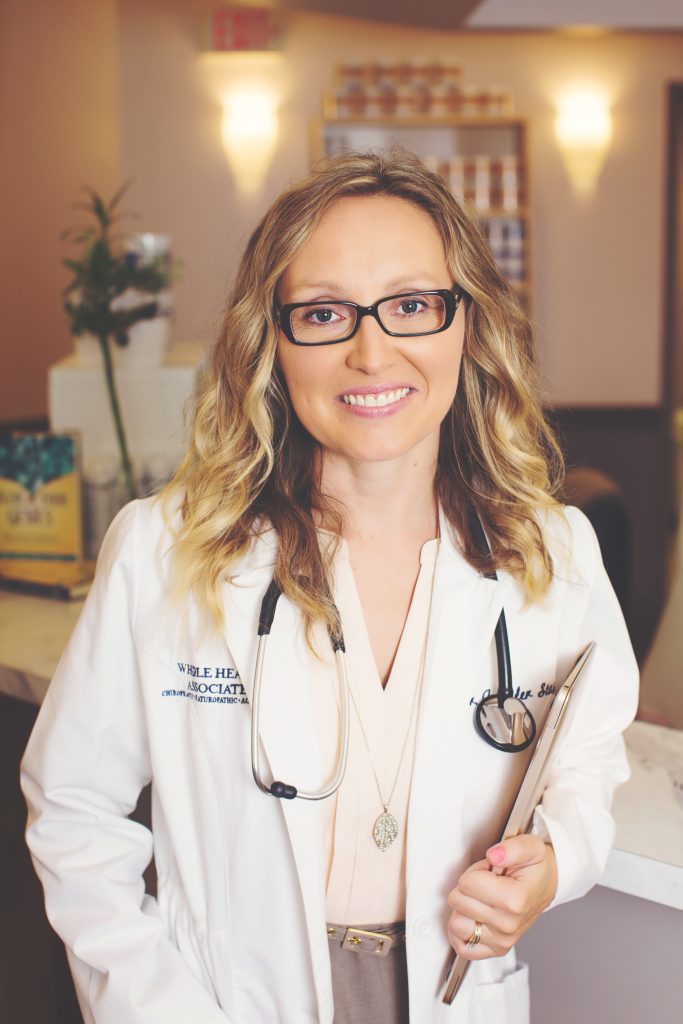#SameHere Docs
Expert Profile - Jennifer Stagg

Dr. Jennifer Stagg, ND
Naturopathic Physician
Founder and medical director of Whole Health Wellness Center in Connecticut
Author of The Bitter Prescription
Author of Unzip Your Genes
Medical editor for the Journal of Herbs, Spices, and Medicinal Plants
Nutrition contributor to NBC, ABC, CBS and FOX
Dr. Jennifer Stagg‘s Bio:
Dr. Jennifer Stagg is the founder and medical director of Whole Health Wellness Center in Connecticut. She is the author of The Bitter Prescription and Unzip Your Genes and is routinely featured as an expert guest in the media on the topic of nutrigenomics and integrative medicine.
Dr. Stagg’s areas of clinical expertise include mental health, weight loss resistance and nutrition, digestive health, metabolic and endocrine disorders, and nutrigenomics. She has always been passionate about science and health and started out as a doctoral student in Biochemistry at the University of Iowa. Dr. Stagg is the former director of the USDA Agricultural Research Service Medicinal Botanical Program at Mountain State University and medical editor for the Journal of Herbs, Spices, and Medicinal Plants. A sought-after speaker, Dr. Stagg has been frequently interviewed, having appeared on NBC, ABC, CBS, and FOX. She also serves on scientific advisory boards, as a medical educator, and as an industry advisor.
What life events or challenges that you have experienced (could be minor, could be major) whether you have experienced them directly or via someone close to you, have had any type of impact on your desire to have a practice focus on patients with mental health challenges?
When I started my medical practice almost 20 years ago, I had no personal experience with mental health issues in my own life or family but I learned very quickly how widespread and impactful mood and stress were to the health of my patients. Each new patient I saw typically had a long list of health problems and it often included a previous diagnosis of a mood disorder or they were already taking a prescription medication to help improve their mood. I also learned that unless I addressed mental health and helped my patients better manage stress, their success with making lifestyle changes to improve their overall health was very low. It became very clear to me that improving their mental health was of primary importance, even when a patient didn’t list it as a concern of theirs that they wanted me to treat. For example, one of my specialties is weight loss resistance and without addressing mental health, we wouldn’t be able to achieve the results that we do.
How did those events impact you emotionally/morally? How, if at all did those events impact the way you view how our current system teaches us to treat patients with mental health challenges?
As a physician, you often develop a close relationship with your patients. They come to open up to you and you may see them at their most vulnerable states. Although most doctors are traditionally trained to not become attached to their patients, I have become emotionally invested and deeply care for my patients, and want them to feel better. Each person is unique and the approach to their care must be individualized. Our current medical system has historically treated patients as a diagnosis first, but we must come to know the person first to better understand how to address whatever health issues they may be facing. Of course, scientific advances in genetics can augment the results we can achieve but that does not replace personal communication in understanding the whole person—mind, body, and spirit.
When and why did you decide to actually focus on working with patients dealing with mental health issues, specifically, and how was your decision shaped by the experiences above?
Over the years, I became quite skilled at treating mood disorders and stress, especially when I started incorporating genetic testing into my approach. Patients and other healthcare providers started referring people to me so I could offer them my unique approach to treatment. I have continued to help patients improve their mental health through personalized, precision medicine. Journeying with patients as they work on their mental health has been one of the most rewarding parts of my practice.
What methods or practices do you utilize to help individuals get/feel better?
As I mentioned, I specialize in precision lifestyle medicine, which means I often incorporate genetic testing into my evaluations to achieve better results more quickly. As a naturopathic physician, I use foundational treatments including personalized medical nutrition and dietary strategies, exercise, nutrients, and herbal medicines, and personalized stress management techniques. In the last couple of years, I have also been using photobiomodulation (whole-body red light therapy) in my clinic to improve mental health and overall health, and there is a growing body of research that supports its use for the treatment of mood disorders, as well as a wide variety of other health conditions.
Contact:
Address: 120 Simsbury Rd, Suite B Avon, CT 06001
Tel: 860-674-0111
Websites: www.wholehealthllc.com

